1961
In 1961, British lawyer Peter Benenson read a newspaper story about two Portuguese students who were jailed for raising their glasses in a toast to freedom.
Appalled by this injustice, he published an appeal titled “The Forgotten Prisoners” in The Observer newspaper urging readers to write letters on behalf of people around the world imprisoned because they exercised their human right.
The response was enormous, and the letter was re-printed all over the world – leading thousands of people to write letters to government leaders. These groups of letter-writers in different countries would form the backbone of the organization that became Amnesty International.
1963
In 1963, Ukrainian Archbishop Josyf Slipyi in Siberia became the first prisoner freed as the result of an Amnesty International campaign. Since then, tens of thousands of prisoners have been released thanks to the letters and actions of our members.
1972
Amnesty International expanded its activities to include a campaign against torture in 1972, and worked for the passage of the UN Convention Against Torture in 1984. Our work on this issue remains a key component of our platform, most recently in advocating for the release of the U.S. Senate report on torture of detainees in CIA custody
1977
In 1977, Amnesty International was awarded the Nobel Peace Prize. In its presentation speech, the Nobel committee said “the defense of human dignity against torture, violence, and degradation constitutes a very real contribution to the peace of this world.”
1980
Ending the death penalty became another key campaign for Amnesty International in 1980, when only nine countries had abolished capital punishment. Today, there are 140. In the United States, public support for the death penalty has declined in recent years, and Amnesty International continues to work at the state and federal level to push to end it once and for all.
Late 1970s to 1980s
In the late 1970s and 1980s, Amnesty International helped spark a new generation of human rights activist through major events in popular culture and music, including The Secret Policeman’s Ball, the Conspiracy of Hope Tour, and the Human Rights Now! Tour.
1990s to 2000s
Amnesty International expanded its mission in the 1990s and early 2000s to include supporting reproductive freedom, holding corporations responsible for human rights violations, and preserving human rights in national security policies in the wake of the September 11 attacks. The campaigns to close the prison at Guantanamo Bay and end mass surveillance of the population continue to be major initiatives.
2010 and On
In recent years, Amnesty International has focused on protecting human rights in the global refugee crisis. In the United States, we’ve been on the ground in Ferguson, Baltimore, and other communities affected by police-related violence, and we published a groundbreaking report calling for reform of laws governing the use of lethal force by police. That report has helped spark local, state, and federal reforms in the United States.
2017
In 2017, we mobilized activists across the United States and around the world to hold newly elected President Donald Trump’s administration accountable for violating human rights, and we are preparing to launch a major global campaign to protect human rights defenders, the activists who are often targeted because they work on the front lines to protect everyone’s human rights.

